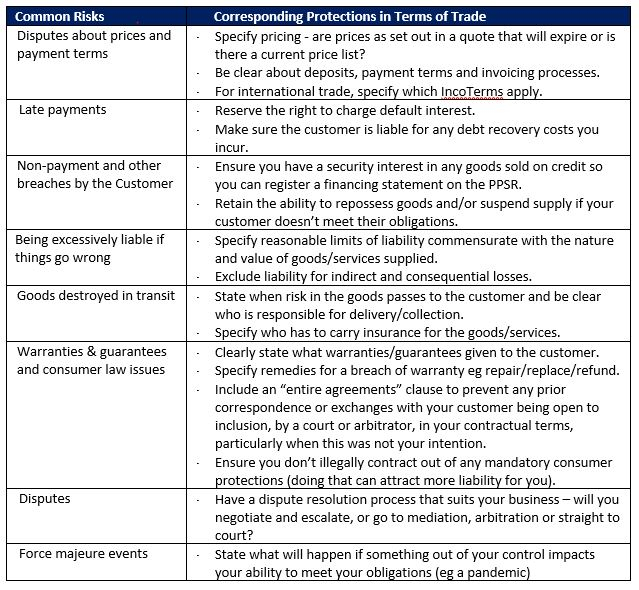Risky Business- Terms of Trade that work for your business
Partners
Phone: +64 7 927 0586
Email: cizzard@clmlaw.co.nz
Bachelor of Laws (University of Victoria), Master of International Law (University of Sydney)
Partners
Phone: +64 7 927 0550
Email: PAnderson@clmlaw.co.nz
Master of Laws (Distinction), Bachelor of Laws, Bachelor of Arts, University of Auckland
Why you need Terms of Trade that work for your business
Terms of Trade are the primary tool used by businesses for allocating the inherent risks of day-to-day business and ensuring their interests are properly protected. Drafted well, Terms of Trade can be the cornerstone of growing a mutually beneficial and long term business relationship with your customers. Drafted poorly, they can have the opposite effect and either provide a sub optimal first impression of your business or sow the seeds of mistrust between you and your customers.
Not having rules of engagement increases the risk of claims and disputes, which cost time and money and can distract from day to day business. As economic pressures continue, we are seeing an increasing number of disputes between parties who did business together based on inadequate Terms of Trade or, in many cases, without any Terms of Trade at all. In most cases, those disputes could have been resolved quickly or avoided entirely if good Terms of Trade had been in place.
Terms of Trade do not need to be convoluted or unduly long, but they should address the specific needs and particular risks of your business. Below are some of the more common risks and options for corresponding protections that can be addressed using Terms of Trade.
Googling terms and conditions online and cobbling together a set for yourself is a high risk strategy.
Firstly, Terms of Trade need to relate to your particular business – some risks are more relevant than others depending on the nature of your goods/services and how you run your business. In our experience, terms and conditions found online and adopted by a business rarely correlate to the needs of the business or align with actual business practices, which can make enforcement and dispute resolution difficult.
Secondly, you need to be confident that your Terms of Trade comply with the law and would stand up under scrutiny from the Commerce Commission. The Fair Trading Act 1986 prohibits unfair terms in all standard form consumer contracts, and the prohibition was recently extended to certain business-to-business contracts up to a certain value. The Commerce Commission can seek a declaration from the High Court that a term is “unfair” if it considers that the term causes detriment to a party if applied, causes significant imbalance in rights or obligations of the parties, and is not reasonably necessary to protect a legitimate interest. If successful, that term cannot be enforced. There are a small number of cases before the Court right now and we’d expect more focus on this from the Commerce Commission now that the regime has been extended to small trade contracts.
If you do not have any Terms of Trade, we strongly suggest you put some in place now. If you have some Terms of Trade that haven’t been reviewed for a long time, dust them off and have a read to see if they still work for your business and cover your key risks.
Cooney Lees Morgan’s Corporate & Commercial team is well placed to help you with Terms of Trade that work for your business. Don’t hesitate to call us or reach out to your usual CLM contact to discuss your situation.
Latest Update: 1st September 2023









